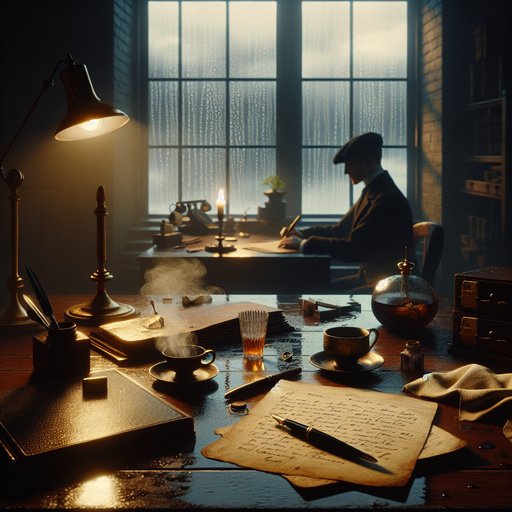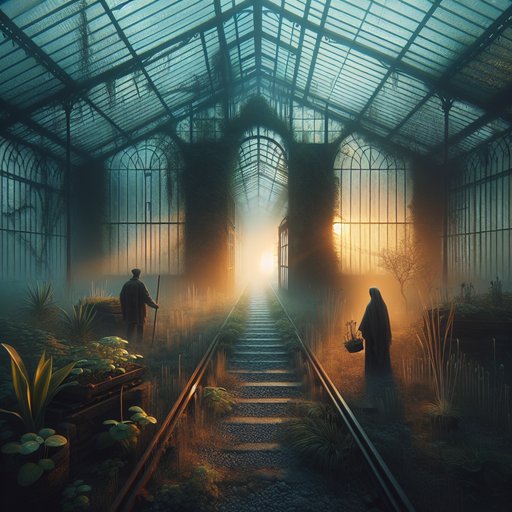
In a quiet office that smells faintly of paper and rain, a clerk keeps a ledger of what the living leave behind. Each entry is a small bridge over the gap mortality opens, a record of last things and the hands that held them. The citizens bring their objects and their urgencies, and the clerk listens as if listening could pin life to the page. It is an unglamorous vocation, this accounting of final fragments, but in the scraps and misunderstandings, in the items smudged with use, a pattern sometimes gleams, then vanishes. She cannot say what it means; perhaps meaning is the wrong shape for what she’s looking for. Still, as storms gather and rooms flood, as plants root in teacups and strangers remember the textures of other palms, she keeps writing, and the ledger grows heavy with lives neither large nor small, only lived, and finite.
Mara works in the Bureau of Last Things, a long room behind the municipal archives where boxes line the shelves like blank faces waiting to be named. Each box holds a single object someone deemed worth carrying to the end: a spoon polished thin by the mouth of one child; a map with a penciled circle around a lake that no longer exists; a loop of keys whose doors have all been replaced. When families arrive, Mara asks for the story that clings to the object, as if breath could be netted and tallied. She moves a pencil through a thick ledger and fills columns titled Name, Date, Object, Circumstance.
There is another column, narrower, called Reason For Holding, which she always writes last. Sometimes people answer quickly. Sometimes they never answer at all. She does not push.
She lets silences sit on the desk like extra, unclaimed things. The widow with the whisk sets it down with care, as if it could still whip the air into peaks. The man who sends in a shoebox of receipts does so by mail, without a letter, and Mara holds the paper with two fingers, noticing where numbers have faded and where they have bitten deep. There is a new directive from above: add a second narrow column, Meaning (as understood).
The parentheses smirk at her. She copies the directive into her ledger and stares at the empty space it creates. Meaning, she thinks, is a river that erases its own banks when you write it down. She flips the pages and sees how the first column insists on dates and the last column insists on what cannot be insisted upon.
Outside, sandbags start to pile along the curb, and the radio speaks a little faster about the storm. That afternoon, a hospice volunteer meets her at the loading dock with a paper cup of dirt and a green cutting in a jar. He introduces himself as Anton and says, without preface, that someone at the hospice wants his last thing to be a plant that knows how to live. The someone is named Eli, and he is in no hurry, which is how he will put it later, when Mara climbs two flights to his room and sits in a plasticky chair.
Eli’s face is a wide valley where stories could dwell. He asks for Mara’s hand when he says hello, as if measuring the future in the span of a palm. He looks at the cutting. He says he used to graft branches onto old rootstock; he liked how the cut surfaces, if pressed well, learned to exchange sap.
Mara nods and looks at his windowsill, which holds three orange peels arranged like boats. She is surprised by how comfortable it feels, to sit with a stranger and not immediately fix him to the page. Back at the Bureau, a pallet of water bottles blocks the hallway, and the roof thumps with rain like a drum trusting its beat more than any calendar. Mara carries the jar, careful not to bruise the new leaves, and finds on her desk an unclaimed box with her name on the label.
It is old, the paper browned at the corners, and beneath her name is a date she remembers by the shadow it cast over childhood: the year her father went missing and then, months later, was found, not in any dramatic place but in the river that runs flat and ordinary through the city. She had not been told about the box, had not known there was anything of him archived here. Her hands tremble before they touch the lid. Inside: a flattened bus ticket, edges gone soft, and a pebble.
The pebble is almost nothing to look at, except for the way it remembers water. She waits to write in the ledger. She lets the objects sit in the pool of lamplight the way one lets words sit in the mouth before saying them, testing if they're true or merely reasonable. As the evening flood warnings press into the building like a second skin, Mara thinks of buses and riverbanks, of who keeps tickets and why.
The city thickens with the smell of wet concrete; someone laughs in the hallway in the strange register laughter finds when it is trying to sound normal. She would like to call her mother, but the thought arrives haunted and leaves the same way. She opens a fresh page and writes her father’s name and the date. For the objects she writes: ticket, stone.
The new column stares. Meaning (as understood). Her body remembers classrooms and the way the teacher would wait, the way the waiting felt like error. She closes the book just as the first drop falls from the ceiling onto her knuckle.
It begins with a single leak and becomes a map of leaks, a constellation that redraws the ceiling’s sky until the plaster itself is a reluctant river. The boxes on the lower shelves take on water. The chalked labels blur into gray weather. Mara moves without choosing, stacking the lighter boxes on desks, emptying the bottom shelves, sliding a tarp over the rows like a blanket thrown over sleeping children.
The radio emits a faraway chorus of advisories. A shutter bangs and bangs. She is alone for a moment with the ledger, its pages open like a slowly breathing lung. She lifts it and the bus ticket together, slips the ticket between two pages as if it could bookmark a way out.
She pulls her boots out of under the desk and wonders if it is foolish to be picky about what to save when the room is all plain grief and cardboard. The door buckles and five neighbors come in, all wet and bright-eyed, saying they heard there were boxes that needed lifting. They do not ask what is inside; their hands make a rope of themselves and begin passing the Archive of Last Things to higher ground. It is like the river deciding, for an hour, to flow in reverse through the arms of strangers.
Mara watches a spoon traveling shoulder to shoulder along with medals and a cracked jade bracelet and a dictionary swollen with names. A boy in a baseball cap slips and laughs and rights himself and keeps going. The floor gets ankle-deep and then calf-deep. Somewhere, a photograph frees itself from its envelope and swims toward the doorway face up, a woman caught forever squinting into sun.
Anton appears in the frame, together with a woman from the hospice, faces slick with rain, and together they shoulder a desk onto chairs. Eli’s cutting sits in its jar like a small lamp, the water around it clouding with soil but the stem still sure, still green. The storm slides off, as storms do: grudging, sated, leaving a municipal tiredness behind. The next morning the Bureau smells like silt and old tea.
Fans whir. Everyone moves a little more slowly, as if they have received morphine. Mara enters the room and finds Anton and Eli in the doorway; Anton pushes Eli’s borrowed wheelchair with the care of someone delivering a fragile promise. Eli takes it all in and says, after a long pause, that it looks like low tide.
He asks if he might hold something. Mara hands him the pebble from her father’s box without saying whose it is. Eli feels its weight and then points, smiling, at the plant rooting fuzzily in the jar by the desk lamp. He asks what the ticket is for, and she tells him: a bus that would have crossed the river at dusk, stopping near the old carwash with the dripping curtains.
Eli nods and says that the pebble is only a pebble until someone carries it long enough that it becomes an ache. Maybe meaning is simply the ache. He asks if she will keep the plant alive, and Mara says yes in the quiet space where questions and vows sound the same. In the afternoons that follow, Mara takes the jar home and sets it near her sink, where light folds in like a napkin.
She trains herself to check the water level as she moves through other motions: kettle, plates, hand on the window, bus braking two streets over. She walks to the river once with the pebble in her pocket, stops where the new floodline is marked with paint, and dips the cutting’s roots into the cool brown water, then lifts it, just to feel it fed by something older than pipes. It occurs to her that the bus ticket might never have been used. It occurs to her that what matters is not a single ride but the fact someone held on to paper long enough that the oils of a hand made a soft, honeyed mark.
Back at the Bureau, she opens the ledger to a clean page and, instead of answers, begins a glossary of gestures: To wait where a bus will come. To cross a bridge and not be noticed by the river. To keep something small alive with your attention. Eli dies on a Wednesday so mild the city seems to forget it can be violent.
Anton comes with a brown paper bag and sets it on Mara’s desk. Inside is a folded handkerchief, recently washed, soft, still wet in one corner where a half-moon of earth has stained it. Eli kept it in his fist when he slept, Anton says, and he asked to send it here with the note that the plant should go back to the window where it could find someone else to look at it. Mara does not write Meaning (as understood) next to the handkerchief.
Instead she turns to the page where she is drafting her glossary and adds a line for Eli. To hand a living thing to another and trust them to hold it their way. She does not name this nothing like an answer and nothing like a refusal. She wraps the handkerchief around the jar for an extra moment, as if warmth could be stored and transferred, even now.
On reopening day, the Bureau smells of damp cardboard and lemon oil. Folks stand in line and whisper in the way people whisper at thresholds. A child peers into a box where a broken ceramic bird sits on a nest of tissue; the child tilts her head the way birds do and asks Mara if the room is a museum or a hospital. Mara says it is a place where things rest between meanings.
The child seems to like that and wanders off counting the cracks in the tile. Mara opens the ledger to her father’s page, breathes, and writes, in the narrow band everyone else must fill with something: To be on your way and to pick up a stone anyway. She does not pretend this sentence holds him. She lets the line live there like a cove where others might dock.
She places the pebble back in its box. At home that evening, she presses the cutting into soil she has packed into a chipped mug. The plant does not perform; it only leans toward the window and begins, invisibly, to change. She sits with a hand around the warm belly of the mug and watches the river hours later, when the city throws back its own bright reflection and the current, for a moment, seems to slow.
Her ledger waits in the other room. It is not any fuller than it was yesterday. She knows the blank columns will keep their hunger. She is startled to find that this bothers her less.
The night brings a breeze with the smell of the same water that had, briefly, become a door. The plant lifts its new leaf and holds it there, a small, precise, living posture that does not answer and does not avoid the question, and Mara thinks, not for the first or last time, that perhaps the work is not to seek a meaning like a single star, but to learn how to hand and hold and be handed on until our names are less important than our enactments.









































